- TOP
- Messages from Students
International Exchange
Messages from Students
Messages from International Students
Improved Abilities in Cross-cultural Communication
Wu Dong Yan (from China)
I came to Japan in July 1997, then I studied as research Student for one and a half years, and now, I am a second year master student in the Education Faculty. This is my first time to live in another country. At first, it was very difficult to get accustomed life here because I didn't know Japanese language and customs. I couldn't communicate well with people around me. Now, my Japanese level is better thanks to the help of the many professors and friends I have in the university. Last year, I even passed the Japanese Language Proficiency Examination. Since then life here has became easier and more interesting for me. I think it will remain a beautiful memory in my life. Here, I would like to thank my supervisor who has helped me in my life and study in Japan, and also all my friends who always help me.
Enjoying Studying and Making Friends Aboard
Im Youk Soon (from Korea)
I'm from Korea. I'd like to point out two things I've benefited from in studying here at Kagawa University. First, I was able to really enjoy and experience Japanese culture. Second, I have had more opportunities to communicate with Japanese youth than when I was in Korea. I have also broadened my horizons in the light of my student life. On campus, I've made lots of friend, so I want to share my feelings with them while studying abroad.
Insights into Japanese Culture
Ang Li Ling (from Malaysia)
Life in Japan as a foreign student has had its ups and downs. Being away from family and coping with a new environment, language and people indeed is part and parcel in gaining new knowledge of life. I am very grateful to Monbusho for giving me this great opportunity. Though I had some knowledge about Japan before coming, I still experienced great culture shock. However, this was overcome with the help of the friendly and kind people here. I am very interested in education in Japan for I believe that education is the central foundation of Japanese people and society the university selected by Monbusho for me, namely Kagawa University, has proven to be an excellent choice. With little knowledge about the Japanese language and kanji, study was difficult, but I am striving to do my best, especially with the help of the professors, Japanese friends and also the other people involved with my stay here. In my remaining two years in Japan I hope to be able to gain a lot of beneficial knowledge to take back to my country, Malaysia. Last but not least, I'd like to try to enjoy my life here as much as the studies and to take home many found memories of my time here.
Learning about Oneself and Others
Marina Pramoso Seniel (from the Philippines)
Living in different country with an entirely different culture --language, beliefs and traditions-- is indeed a difficult but exhilarating experience, It teaches one more significant points in life-- to be tolerant of other people's outlook towards many things, to respect cultural diversity, to live harmoniously with others without losing one's own identity and among other things. Being an ambassador of goodwill, I know the expectations, duties and responsibilities; but I firmly believe that with the help of the people in Kagawa University, teachers, friends, colleagues and students, the goal of fostering camaraderies and cultural understanding will never be out of reach. Therefore, allow me to express my deepest gratitude to the Japanese government for giving me this rare opportunity of enhancing my personal growth and deepening my understanding of the world. To my teachers, for continuous support and limitless patience, my sincerest thanks. Consequently, with the Japanese training I will acquire here, I see myself as a better citizen of my nation and a more productive individual of the world.
Messages from Japanese Students
What I Learnt in Thailand
Ryushi OSAKI
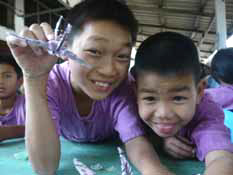 It happened when I arrived at Chiang Mai airport: that smell. That special smell of Southeast Asia, it really hit me. I was shocked that even though it was only early March here, as it is basically always a summer climate here, the temperature was over 37C. Thailand is famous the world over for its Reclining Buddha, palaces and intricately designed temples.
It happened when I arrived at Chiang Mai airport: that smell. That special smell of Southeast Asia, it really hit me. I was shocked that even though it was only early March here, as it is basically always a summer climate here, the temperature was over 37C. Thailand is famous the world over for its Reclining Buddha, palaces and intricately designed temples.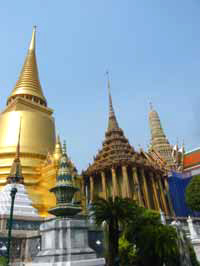 I was totally overwhelmed by the temple in the picture on the right. I realised how hard it must have been to build so many historic buildings in such a hot climate. That was how I started my time in Thailand.
I was totally overwhelmed by the temple in the picture on the right. I realised how hard it must have been to build so many historic buildings in such a hot climate. That was how I started my time in Thailand.
I’d like to introduce some of the things I experienced in Thailand. Thailand is a Buddhist country, as is Japan, but in Thailand there is the tradition that men become a Buddhist priest once in their lives. I imagine that begging for food and alms and meditating for hours on end must be hard work. I realised that in Thailand Buddhism is a living part of people's lives. The people respect the priests and temples. I went to one very friendly temple in a small village and asked one of the young priests there who could speak English lots of questions about Buddhism, (see the picture on the following page.)
Thai food uses a lot of chilli peppers and various herbs and spices, and for me it was generally quite hot and spicy. I also really enjoyed the desert made with sweet Thai sticky rice, coconut milk and papaya.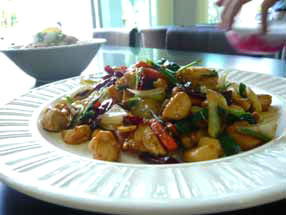 There were also a lot of foods that really surprised me. Deep friend insect larva, durian (the smell of which reminded me of rotten eggs), and one condiment with a rather strong smell. It wasn’t really
my cup of tea!
There were also a lot of foods that really surprised me. Deep friend insect larva, durian (the smell of which reminded me of rotten eggs), and one condiment with a rather strong smell. It wasn’t really
my cup of tea!
Our group had two homestays, one in Chiang Mai and another in Doi Tao, a small rural village. The toilets in Doi Tao really surprised me. When you think of a toilet, I am sure you imagine a Western style toilet and toilet paper nearby. However, in Thailand in the countryside, there was no toilet seat and no toilet paper. Instead of toilet paper, people use a little water nozzle to clean themselves. That really surprised me!!
We had a very busy schedule. We went for an elephant
ride, had a traditional Thai massage, went for a swim in a
river, 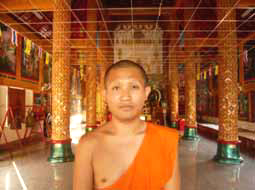 visited to an orphanage where we taught groups of
students there how to make origami and practiced
making Japanese calligraphy. Students from Chiang Mai
University also taught us Thai. We even went to a cabaret
show in Bangkok. It was really a full programme filled with many things I would not have been able to
experience in Japan.
visited to an orphanage where we taught groups of
students there how to make origami and practiced
making Japanese calligraphy. Students from Chiang Mai
University also taught us Thai. We even went to a cabaret
show in Bangkok. It was really a full programme filled with many things I would not have been able to
experience in Japan.
In a nutshell, I would have to call Thailand “The Land of Smiles”. In Thailand even when you meet a complete stranger, people will greet you with a smile. It’s a part of their culture. I’m not sure if this is only true in Thailand amongst Asian countries, but I think it is quite unimaginable in countries in the Far East, such as Japan, the Koreas, and China. I think this helps explain the Thais high level of hospitality towards others. Thailand shares borders with four countries: Burma, Laos, Cambodia and Malaysia. 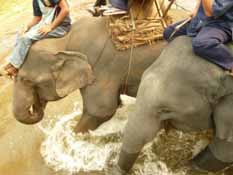 These four countries are facing various problems including conflicts, starvation, and poverty. As a result of its good relations with its neighbours, Thailand have been able to welcome people with a smile. When I was in Thailand and greeted strangers with a smile, I didn’t feel shy but felt quite happy. On the other hand, there are many people in Thailand suffering from poverty.
These four countries are facing various problems including conflicts, starvation, and poverty. As a result of its good relations with its neighbours, Thailand have been able to welcome people with a smile. When I was in Thailand and greeted strangers with a smile, I didn’t feel shy but felt quite happy. On the other hand, there are many people in Thailand suffering from poverty. 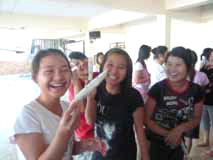 The average wage in Thailand for an eight-hour work day is about 400 yen. I saw quite a few people begging in the streets. There is a big gap in wealth. Some people were living just as the Japanese had done just after Word War II, whereas others were living, whereas other were living the same lifestyle as if they were in a big modern city such as Osaka. Some people work for a company. There were also others earning their living as mahouts, and also others who made ends meet by selling things at street stalls. I thought that there is a great diversity in Thailand in what people do.
The average wage in Thailand for an eight-hour work day is about 400 yen. I saw quite a few people begging in the streets. There is a big gap in wealth. Some people were living just as the Japanese had done just after Word War II, whereas others were living, whereas other were living the same lifestyle as if they were in a big modern city such as Osaka. Some people work for a company. There were also others earning their living as mahouts, and also others who made ends meet by selling things at street stalls. I thought that there is a great diversity in Thailand in what people do.
 I realised after encountering Thai culture that there is a Japanese presence in modern Thai culture. Japanese manga and cakes are very popular, and about sixty percent of the cars in Thailand were Toyotas. I noticed ads on TV with images of Mt. Fuji in them. I realised Japan has a strong presence in other Asian countries. Travelling abroad and looking at Japan objectively from outside made me appreciate the great culture that Japan has. I wonder how many Japanese appreciate that. Thailand is a constitutional monarchy and has a King, like Japan has the Emperor. At 8:00 a. m. and 6:00 p. m. every day the national anthem is played and people in the street stop what they’re doing and stand still while the anthem is played. In every home there is an image of the King, whom Thais have a very deep respect for. I felt that we Japanese have something to learn from the Thai people here. I also felt that I wanted to find out more about my own country, Japan. When I become a teacher in the future, I hope I can to express these things to my young students.
I realised after encountering Thai culture that there is a Japanese presence in modern Thai culture. Japanese manga and cakes are very popular, and about sixty percent of the cars in Thailand were Toyotas. I noticed ads on TV with images of Mt. Fuji in them. I realised Japan has a strong presence in other Asian countries. Travelling abroad and looking at Japan objectively from outside made me appreciate the great culture that Japan has. I wonder how many Japanese appreciate that. Thailand is a constitutional monarchy and has a King, like Japan has the Emperor. At 8:00 a. m. and 6:00 p. m. every day the national anthem is played and people in the street stop what they’re doing and stand still while the anthem is played. In every home there is an image of the King, whom Thais have a very deep respect for. I felt that we Japanese have something to learn from the Thai people here. I also felt that I wanted to find out more about my own country, Japan. When I become a teacher in the future, I hope I can to express these things to my young students.
Thank you for reading my meandering sentences to the end. I would like to finish up by expressing my sincere thanks to all the teachers, students and staff at Chiang Mai University, as well as the teachers and students from Sapporo Gakuin University who were in our group. Also I would like to express my thanks to all the other people we met in Thailand who helped me and this programme in so many ways.
Korp kun krap! ありがとう! Thank you very much!